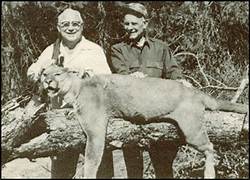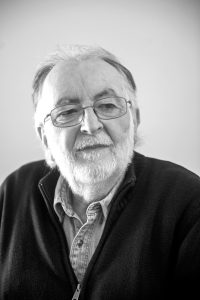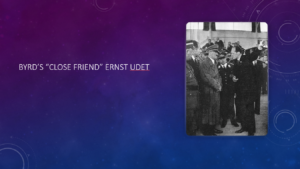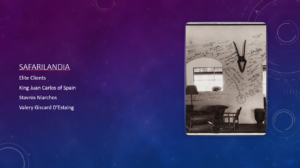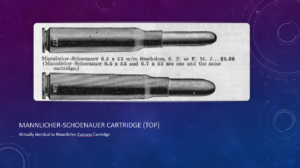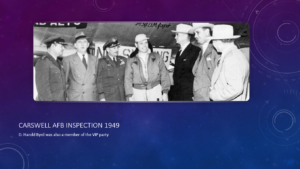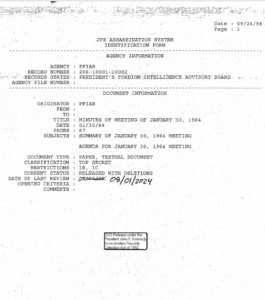
PFIAB Summary 1961-1963 RIF# 206-10001-10002; 68 pages DOWNLOAD HERE
17 April, 2025
Perhaps the most significant new information from the recent releases of JFK assassination records are Top Secret memos concerning the activities of the President’s Foreign Intelligence Advisory Board (PFIAB) during Kennedy’s Presidency. Review of these records leads one to conclude that JFK used his PFIAB to pursue reorganization of the CIA following the failed Bay of Pigs operation.
JFK assassination researchers have long suspected that failure of the Bay of Pigs operation led to Kennedy’s decision to dramatically reorganize an overgrown CIA. What has not been known until now is that Kennedy pursued this objective through his PFIAB. Kennedy’s effort to reorganize CIA ended with his assassination in November 1963.
Although the broad outlines of Kennedy’s plan have been known, the newly released documents contain proposals previously unknown. For example, PFIAB recommended that the Director of Central Intelligence (Allen Dulles) be shifted into the Executive Office of the President, not just on paper, but that his workplace be moved as well. An idea was floated to change the name of the CIA. Another recommendation was that consideration be given to not moving key CIA components into its new headquarters building at Langley, Virginia and that offices be scattered. Or at a minimum that covert functions not be housed at the new headquarters and moved to another city. None of these changes were implemented, revealing that CIA won the bureaucratic war.
Upon taking office JFK kept Eisenhower’s PFIAB in place. JFK’s father had served on the PFIAB in 1956, so there was some family knowledge of the body. Vice-President Johnson may not have known of the actions of the PFIAB. Among the PFIAB members JFK inherited was General Jimmy Doolittle, World War II Medal of Honor winner and intelligence adviser to Eisenhower. Doolittle served on PFIAB during the entire Kennedy Presidency, with expertise in the U-2 and A-12 spy plane programs as well as the TAGBOARD drone.
AARC’s research had uncovered that Doolittle was a “substantial friend” and “hunting buddy” of Texas School Book Depository building owner David Harold Byrd. Byrd was a successful oil wildcatter who invested his new wealth in defense industries involving aviation and intelligence, focused on aerial reconnaissance, a priority concern of JFK’s PFIAB. Byrd and Doolittle hunted together in South Africa, according to a photograph in Byrd’s autobiography.
It is likely that Doolittle through his PFIAB membership had access to the secrets of the Kennedy administration related to forced reorganization of the CIA and all other intelligence matters. Bill Simpich found an excerpt from a PFIAB meeting in June 1963 in which Doolittle is described as head of PFIAB’s CIA Panel and Doolittle is asked to brief the board on the status of JFK’s requests for changes at CIA that were not being carried out by CIA. RIF # 206-1001-10017
It is reasonable to wonder if Doolittle discussed these issues with his substantial friend and “hunting buddy” Byrd. The author is reminded of the oft repeated refrain of criminal investigators, ‘I don’t believe in coincidences.’
Dan Alcorn
President, Assassination Archives and Research Center
RELATED: New Findings About Texas School Book Depository Building Owner David Harold Byrd

